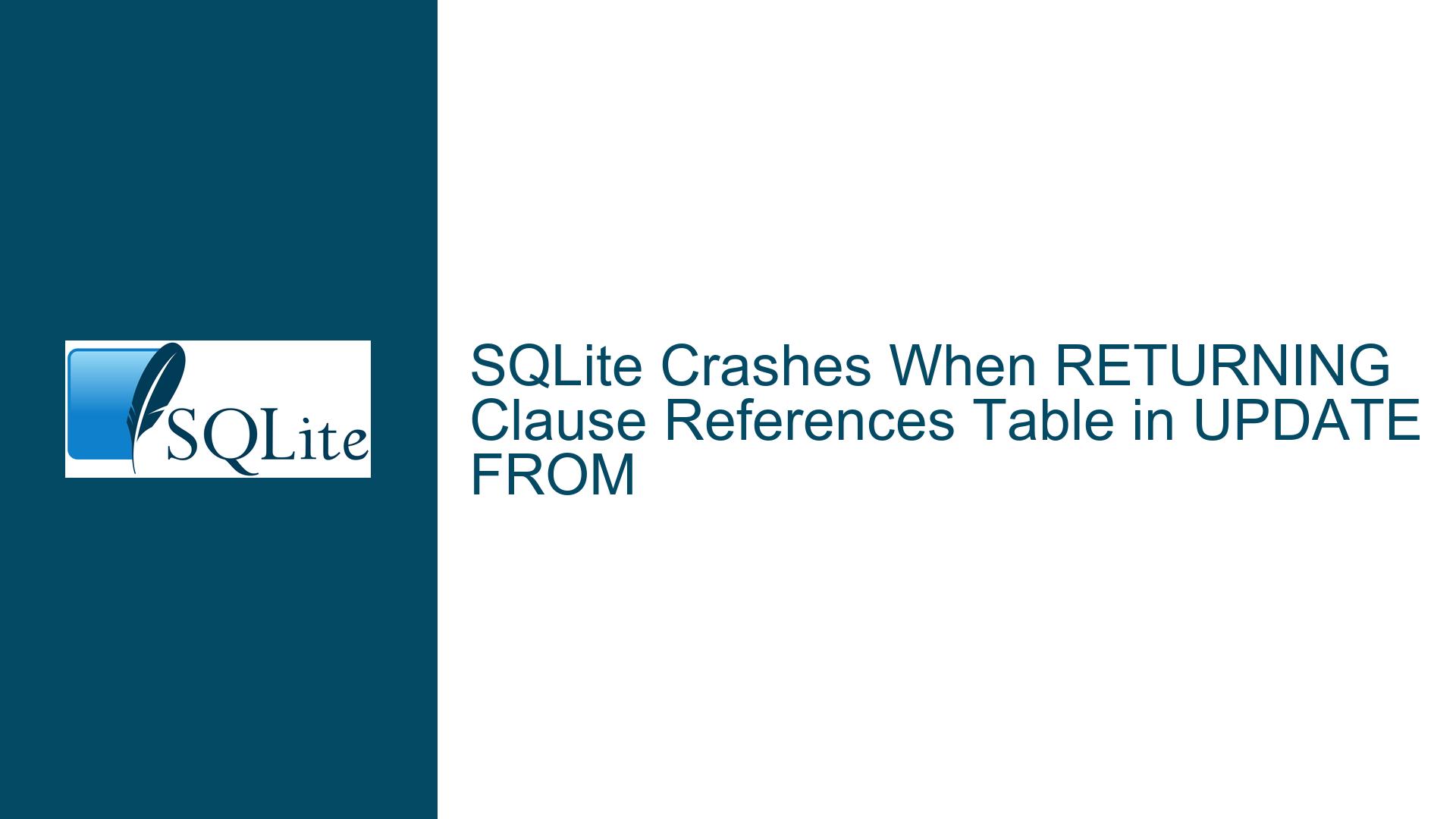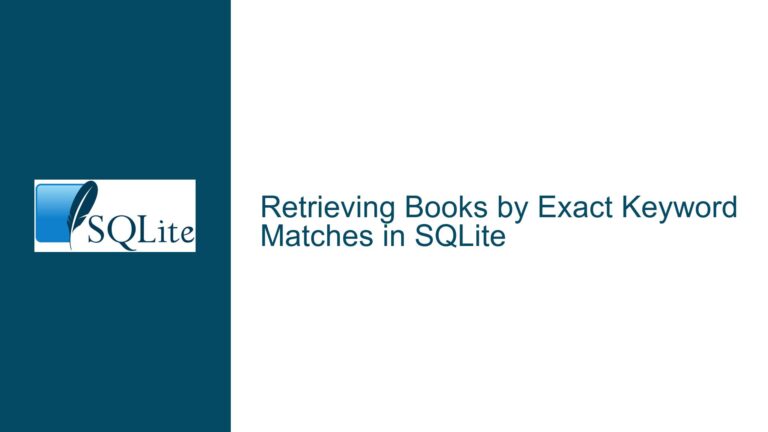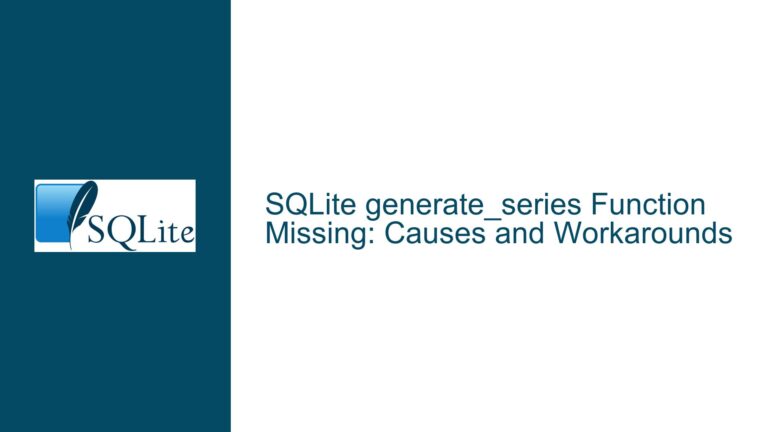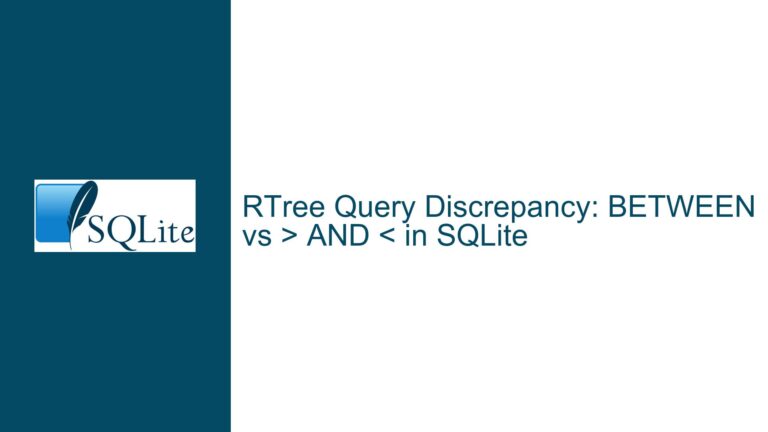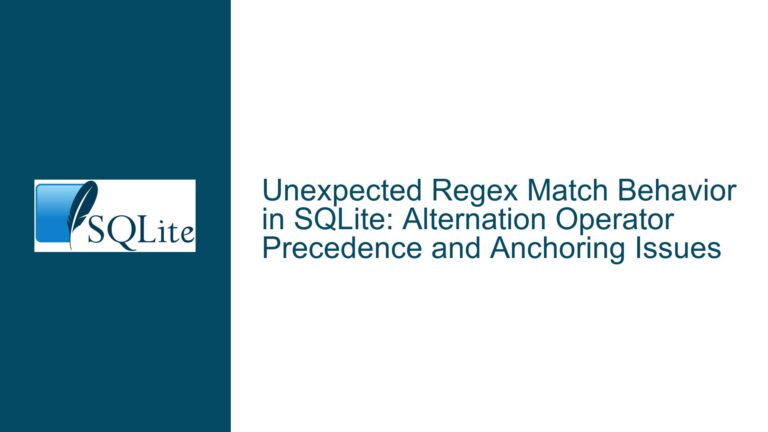SQLite Crashes When RETURNING Clause References Table in UPDATE FROM
SQLite Crashes Due to Improper Table References in RETURNING Clause
The core issue revolves around SQLite crashing when the RETURNING clause in an UPDATE statement references a table that is not the primary target of the update. Specifically, when the RETURNING clause attempts to return columns from a table listed in the FROM clause of an UPDATE FROM statement, SQLite either crashes or produces incorrect results. This behavior is inconsistent with the intended functionality of the RETURNING clause, which is designed to return values from the table being updated, not from auxiliary tables referenced in the FROM clause.
For example, consider the following SQL statements:
CREATE TABLE x(a, b);
CREATE TABLE y(c, d);
UPDATE x SET a = c FROM y WHERE b = d RETURNING y.*;
In this case, SQLite crashes because the RETURNING clause attempts to return all columns from table y, which is not the table being updated. Similarly, the following statement also crashes:
UPDATE x SET a = c FROM y WHERE b = d RETURNING x.*;
Even though x is the table being updated, the use of the wildcard * with a table qualifier (x.*) causes SQLite to crash. This behavior highlights a fundamental limitation in SQLite’s handling of table references in the RETURNING clause.
Improper Handling of Table Aliases and Wildcards in RETURNING Clause
The root cause of the issue lies in SQLite’s incomplete implementation of the RETURNING clause, particularly when it comes to handling table aliases and wildcard references. The RETURNING clause is designed to return values from the table being updated, but it does not properly validate or handle references to other tables or aliases. This leads to crashes or incorrect results when the RETURNING clause includes table qualifiers or references to tables not involved in the update.
For instance, the following statement demonstrates the improper handling of table aliases:
UPDATE x AS t SET a = 1 WHERE t.a = 1 RETURNING t.a;
In this case, SQLite throws an error because it does not recognize the alias t in the RETURNING clause, even though the alias is valid in the UPDATE statement itself. This limitation stems from the fact that the RETURNING clause only knows the canonical name of the table being updated and does not recognize aliases defined in the UPDATE statement.
Additionally, SQLite fails to properly validate table references in the RETURNING clause. For example, the following statement does not produce an error, even though it references non-existent tables:
CREATE TABLE t1(a INT, b INT);
INSERT INTO t1(a, b) VALUES(1, 2);
UPDATE t1 SET b = b + 1 RETURNING nosuchtable.a, another.b;
In this case, SQLite silently ignores the invalid table references (nosuchtable.a and another.b) and returns the columns a and b from the table t1. This behavior is inconsistent with the expected behavior of the RETURNING clause, which should either return values from the table being updated or throw an error if invalid table references are encountered.
Fixing SQLite’s RETURNING Clause Implementation
To address these issues, SQLite’s implementation of the RETURNING clause needs to be updated to properly handle table references and aliases. The following steps outline the necessary changes and workarounds:
Validate Table References in RETURNING Clause: SQLite should validate all table references in the
RETURNINGclause to ensure they refer to the table being updated. If a table reference is invalid or refers to a table not involved in the update, SQLite should throw an error rather than silently ignoring the reference or crashing.Support for Table Aliases in RETURNING Clause: SQLite should be updated to recognize table aliases defined in the
UPDATEstatement when processing theRETURNINGclause. This would allow users to use aliases in theRETURNINGclause, consistent with their use in the rest of theUPDATEstatement.Proper Handling of Wildcard References: SQLite should properly handle wildcard references (
*) in theRETURNINGclause, ensuring that they only return columns from the table being updated. If a wildcard reference includes a table qualifier (e.g.,x.*), SQLite should validate that the table qualifier refers to the table being updated and throw an error if it does not.Documentation Updates: The SQLite documentation should be updated to clearly state that the
RETURNINGclause can only return columns from the table being updated. This would help users avoid common pitfalls and ensure that their queries are compatible with SQLite’s implementation.Testing and Validation: Extensive testing should be conducted to ensure that the updated implementation of the
RETURNINGclause behaves as expected in all scenarios, including complexUPDATE FROMstatements and queries involving table aliases.
Example Fixes and Workarounds
To avoid crashes and incorrect results, users can modify their queries to ensure that the RETURNING clause only references the table being updated. For example, instead of:
UPDATE x SET a = c FROM y WHERE b = d RETURNING y.*;
Users should write:
UPDATE x SET a = c FROM y WHERE b = d RETURNING x.*;
Or, if they need to return specific columns from the updated table:
UPDATE x SET a = c FROM y WHERE b = d RETURNING x.a, x.b;
If users need to return values from auxiliary tables, they can use subqueries or joins in the RETURNING clause. For example:
UPDATE x SET a = c FROM y WHERE b = d RETURNING x.a, (SELECT y.d FROM y WHERE y.c = x.a);
This approach ensures that the RETURNING clause only references the table being updated while still allowing users to retrieve values from other tables.
Summary of Changes in SQLite 3.35.4
The issues described above were addressed in SQLite version 3.35.4, which introduced several fixes and improvements to the RETURNING clause implementation. Key changes include:
- Validation of Table References: SQLite now validates table references in the
RETURNINGclause, ensuring that they refer to the table being updated. Invalid table references result in an error rather than a crash or incorrect results. - Improved Handling of Wildcard References: SQLite now properly handles wildcard references (
*) in theRETURNINGclause, ensuring that they only return columns from the table being updated. - Documentation Updates: The SQLite documentation was updated to clarify the limitations of the
RETURNINGclause, particularly with regard to table references and aliases.
These changes ensure that the RETURNING clause behaves as expected and provide users with a more robust and reliable way to retrieve values from updated rows.
Conclusion
The issues with SQLite’s RETURNING clause highlight the importance of proper validation and handling of table references in SQL queries. By addressing these issues, SQLite has improved the reliability and usability of the RETURNING clause, making it a more powerful tool for retrieving values from updated rows. Users should ensure that their queries comply with the updated implementation and avoid referencing tables or aliases that are not part of the update operation. With these changes, SQLite continues to provide a robust and efficient database solution for a wide range of applications.
